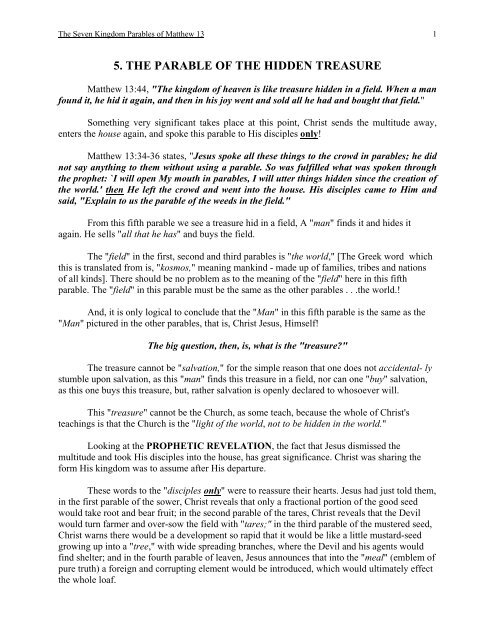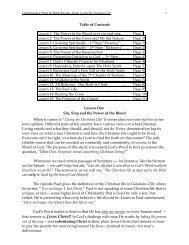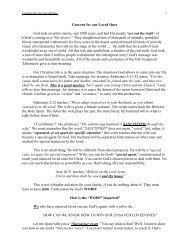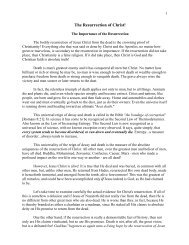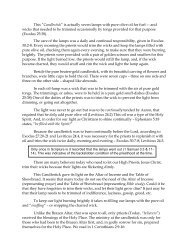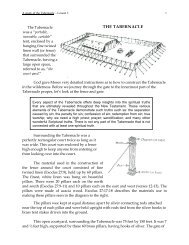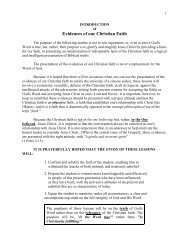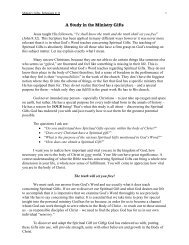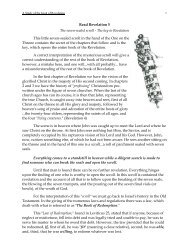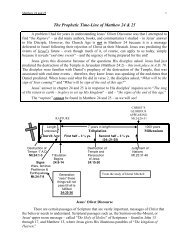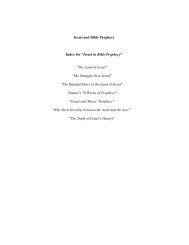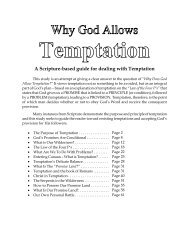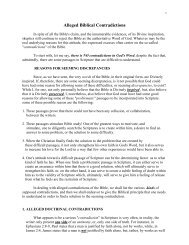5. THE PARABLE OF THE HIDDEN TREASURE - NetBibleStudy.com
5. THE PARABLE OF THE HIDDEN TREASURE - NetBibleStudy.com
5. THE PARABLE OF THE HIDDEN TREASURE - NetBibleStudy.com
- No tags were found...
You also want an ePaper? Increase the reach of your titles
YUMPU automatically turns print PDFs into web optimized ePapers that Google loves.
The Seven Kingdom Parables of Matthew 13 3Romans 11:28, "As far as the gospel is concerned they [Israel] areenemies on your account . . . [that is, God rejects them, to make roomfor you] . . . but as far as election is concerned, they [Israel] are lovedon account of the patriarchs, (verses 30-32), "Just as you [Gentiles]who were at one time disobedient to God have now received mercy as aresult of their [Israel's] disobedience, so they too have now be<strong>com</strong>edisobedient in order that they too may now receive mercy as a result ofGod's mercy to you . . . [Just as you Gentiles. At one time had notyielded unto God, and yet now you have received mercy by Israel'srefusal to yield, so they also have now refused to yield but someday theywill share in God's mercy upon you.].Keep in mind that we are dealing with a Triple Approach in understanding theseparables of the kingdom:1. The Primary Interpretation, [that is, God's plan for Israel and the Church]2. The Practical Application, [God's kingdom in the believer's life]3. The Prophetic Revelation," [ the prophetic view of God's plan for mankind].At the risk of repetition, I remind you of these three different approaches inunderstanding these parables. While I am, also, presenting the "Prophetic Revelation" in thisstudy, in order to give the student a grasp of the entire meaning of this passage in Matthew 13,however, my main purpose for the study is the "Practical Application." In doing so, however,we must keep these three areas clear, or there will be confusion.<strong>THE</strong> PRACTICAL APPLICATION, in light of the kingdom of God in the believer'slife, in this parable of the hidden treasure, would be, "the kingdom of God" - the wonderful,precious supremacy of the Lord, Jesus Christ - is to be hidden within our hearts. This "treasure,"purchased at great price, is our inner, hidden resource of life.The world will not see, nor understand, but in times of difficulty, persecution, andhardship we quietly "turn it over to the Lord's reign" and let Him work it out.CHRIST'S RULE BECOMES <strong>THE</strong> BELIEVER'S MOTIVATIONFOR LIVING AND GIVES TRUE JOY!6.<strong>THE</strong> <strong>PARABLE</strong> <strong>OF</strong> <strong>THE</strong> PEARL <strong>OF</strong> GREAT PRICE!Matthew 13:45-46, "Again, the kingdom of heaven is like a merchant looking for finepearls. When he found one of great value, he went away and sold everything he had andbought it."This sixth parable is probably the best known and yet, the most misunderstood orwrongly interpreted than any of the seven parables of the kingdom of heaven.
The Seven Kingdom Parables of Matthew 13 4A grasp of the seven lessons taught by these seven parables will enable the student to liveunder Christ's reign and rule, and keep him from being caught in the throes of misrepresentationsof Christian living that are so <strong>com</strong>mon in our day.A general conception, <strong>com</strong>monly advanced, is that: "Christianity is likened unto one whoearnestly desires and diligently seeks salvation, as a result of his efforts, he is rewarded byfinding Christ, `The Pearl of Great Price' He then, forsakes all and follows Him!"<strong>THE</strong> OBJECTIONS TO THIS <strong>THE</strong>ORY ARE:1. The sinner does not "earnestly and diligently seek salvation - the Lord seeks him!2. The sinner cannot "sell anything to buy salvation."He has nothing to sell and, anyhow, salvation cannot be purchased.3. This man in the parable "buys the one pearl of great price."Can any sinner "buy" Christ?<strong>THE</strong> "PEARL <strong>OF</strong> GREAT PRICE" IS NOT JESUS CHRIST – NOR SALVATION,– FOR NEI<strong>THE</strong>R CAN BE PURCHASED!Throughout these seven parables the "Man" referred to is Christ Jesus, therefore, it isonly logical to conclude that the "Man" in this sixth parable (the Pearl of Great Price) is, also,Jesus Christ, seeing He is the "Man" in all of the other parables!What did Jesus say this "Pearl of Great Price" is likenedunto?Jesus said, "It is likened unto the kingdom of heaven."NOTE <strong>THE</strong> FOLLOWING:1. This "Merchant Man" desire this "pearl of good value."As one reads the New Testament, he is made to realize that what Jesus Christ desiresmore than anything else is to rule and reign in the believer's heart and life. He desiresfor believers to be submissive to His will and authority! Nothing <strong>com</strong>es through moreclearly than this in the New Testament.2. This Merchant Man regards this pearl as being of "great price."There is not a more staggering thought in all of the Bible than, not only that Jesusdesire us, but that we should be of "great price" to Him.3. This Merchant Man "sold all that He had to gain the great pearl.""He sold all that He had," are words that are easily uttered, but our minds areincapable of ever understanding all that they imply. 2 Corinthians 8:9 teaches, "JesusChrist, though He was rich, yet for your sakes He became poor, so that you throughHis poverty might be<strong>com</strong>e rich."
The Seven Kingdom Parables of Matthew 13 54. This Merchant Man "sought the pearl."No one could ever enlarge upon Peter's teaching in 1 Peter 1:18-19, which states, "Foryou know that it was not with perishable things such as silver or gold that you wereredeemed . . . but with the precious blood of Christ."LET'S TAKE A LOOK AT <strong>THE</strong> "PEARL" ITSELF1. The "pearl" was the object of the greatest value to the Merchant Man2. The pearl is the only gem that is a product of a "living creature."The kingdom of God is something that is ALIVE within the believer's heart.What a wonderful picture of Christ's kingdomat work within the believer!Down in the ocean's depths lives a small animal encased in a shell, we call itan "oyster!" A foreign substance, such as a grain of sand intrudes, causing theoyster to exude a substance called "nacre" and covers whatever it is thatcauses the wound. The oyster repeats this process again and again, one layerafter another of that nacre is cast out by that little oyster, until ultimately thereis built up a priceless pearl!3. A pearl is a product of "suffering."The pearl is the answer to the injury that was inflicted upon the oyster. It is theoffending particle that ultimately be<strong>com</strong>es the object of beauty! That which injured theoyster be<strong>com</strong>es a precious gem!Acts 14:22, "We must through much tribulation enter into the kingdom of God."4. The pearl is formed "slowly and gradually."The pearl does not <strong>com</strong>e into existence in a single day. There is a tedious process ofwaiting while the pearl is being slowly, but surely, formed, and, although, salvation isinstant, the process of the formation of the kingdom of God. . . [The reign and rule ofChrist Jesus in the believer's life, by the power and grace of God] . . . takes a life time!<strong>5.</strong> The pearl has a "lowly origin."A beautiful pearl, originally had its home in the depths of the sea, amid the mire andfilth, because that is where the oyster congregates. The oyster is a scavenger of theocean.This lowly origin of the pearl reminds us of our humble beginning, who, but by thegrace of God, are by nature creatures of the filth and mire and ruin of Adam's fall (SeeEphesians 2:11-12).6. The pearl is formed "secretly," down in the ocean's depths.
The Seven Kingdom Parables of Matthew 13 6The process of God's kingdom, Christ ruling our hearts, is often unseen by the eye ofman, secretly taking place within our life.7. The pearl is an object selected for honor and exalted future.That object in the ocean's depths, unseen by the eye of man, is gradually built up until,ultimately it has a position of importance, such as the diadem of a king's crown. Itbe<strong>com</strong>es a jewel of royalty, it was made for this!This is what God wants to ac<strong>com</strong>plish, by the power of the Holy Spirit working out thekingdom of heaven, Christ ruling and reigning in every area of the believer's life.Just as the pearl of "The Pearl of Great Price" had a lowly origin, and ultimatelygained a position of dignity, honor and glory, so God will take the believer's characterand disposition and work out something beautiful for His glory, if the believer will letHim ac<strong>com</strong>plish this in his life.8. A pearl is the result of the full attention of the oyster.The oyster seeks to ease the irritation of the foreign substance by throwing off asecretion which forms over the sore and irritated spot. The oyster be<strong>com</strong>es weaker andweaker as it puts off this secretion, all of which adds to the formation of the "pearl."The pearl is made; or perfected, through the lingering, torturous, suffering death of theoyster.What makes the beautiful pearl seem so blue-white, is this layer upon layer which isfrom the substance put off by the oyster during this process of irritation.What a beautiful picture of what God is seeking to ac<strong>com</strong>plish in our lives duringtimes of "irritation."Whenever experiences of difficulty or hardship <strong>com</strong>e into the believer's life, he canrespond in one of two ways: (1) he can either re-act in his own self, doing what he thinks is bestfor him, or, (2) he can submit to Christ's reign in his life and do what God wants done.Should a grain of sand intrude into the eye, it would bring infection, maybe even the lossof sight, because of the reaction of the human eye. It's very nature is to protect itself, to rid itselfof any foreign element that is distasteful or irritating to it. However, should that same grain ofsand enter an oyster, instead of rejecting it, the oyster produces a concretion. The oyster does notre-act, but it acts! It accepts the irritation! That offending particle ultimately be<strong>com</strong>es a thing ofgreat beauty - a pearl of great price.REMEMBER, IT IS NOT <strong>THE</strong> SOURCE <strong>OF</strong>IRRITATION THAT PRODUCES <strong>THE</strong> HARM, BUT <strong>THE</strong>ACTION, OR RE-ACTION <strong>OF</strong> <strong>THE</strong> SUBJECTINVOLVED!
The Seven Kingdom Parables of Matthew 13 77. The Parable of The DragnetMatthew 13:47-50, "Once again, the kingdom of heaven is like a net that was let downinto the lake and caught all kinds of fish. When it was full, the fishermen pulled it up on theshore. Then they sat down and collected the good fish in baskets, but threw the bad away. Thisis how it will be at the end of the age. The angels will <strong>com</strong>e and separate the wicked from therighteous and throw them into the fiery furnace, where there will be weeping and gnashing ofteeth."One more parable remains to <strong>com</strong>plete one's under- standing of "the kingdom of heaven."It is this parable of the "Dragnet."Remember, the kingdom of heaven (or the kingdom of God) is the rule or government ofGod within the heart and life of the believer. No where in this present world does God havesubjects that His reign is likened unto a kingdom, except in the lives of Christians. Each of theseseven parables are illustrations to help the believer to understand the purposes - and out<strong>com</strong>e - ofthis "kingdom of heaven."EVEN <strong>THE</strong> "ORDER" <strong>OF</strong> <strong>THE</strong>SE <strong>PARABLE</strong>S SUPPLIES AKEY TO <strong>THE</strong>IR INTERPRETATION1. The first parable, "the parable of the sower," reveals the introduction of thekingdom of heaven, that introductory work being the broadcast sowing of the seed of"the word of the kingdom."
The Seven Kingdom Parables of Matthew 13 82. The second parable, "the parables of the wheat and the tares," shows the work ofSatan in his seeking to destroy God's rule in the believer's life3. The third parable, "the parable of the mustard seed," reveals the giant-likemonstrosity of an "outward" growth, which is only man's work and was never theintent or purpose of God's kingdom.4. The fourth parables, "the parable of leaven," warns of the "inward" invasion ofcorruption to destroy the real purpose of Christ's kingdom.The last three parables were not spoken to the multitude,but, rather, they were spoken to Jesus' disciples only andthey treat the internal, hidden aspects of the kingdom ofheaven.<strong>5.</strong> The fifth parable, "the parable of the hidden treasure," shows "the kingdom ofGod" as a precious treasure, hidden, to be revealed sometime later.6. The sixth parable, "the parable of the pearl of great price," we see that "thekingdom of God" is a process Christ Jesus takes the believer through in order todevelop worth and potential.When the student <strong>com</strong>es to this seventh parable, he finds that it is quite unlike the othersix parable. It has a distinct message that we would do well to understand. This seventh parableis bringing the kingdom of God to the conclusion, the climax, in its earthly purpose. In a sense,this seventh parable, "the parable of the fish net," amplifies the other six parables.Up to this point of the seven parables, " one" man is at work, sowing the good-seed,seeking a treasure and a pearl of great price, however, now, for the first time, the pronoun "they"is introduced . . . "Which, when it (the net) was full, they (the fishermen) drew to shore . . ."[Matthew 13:48].Jesus said, "Follow Me, and I will make you fishers of men." Followers of Christ are the"human instruments" whom God uses to establish His kingdom. They have been <strong>com</strong>manded "togo into all the world and preach the Gospel (that is, proclaim the Good News of the kingdom).They are to "cast the net" and the object of the "net" is simply to draw out "good fish."The "sea," as we have seen, represents all humanity, standing for "peoples, multitudesand nations" (Revelation 17:15).The "fishermen" are those who are used of God to draw, or gather, the good fish.It is interesting to note that the inconspicuousness of these "fishermen." in this parable.They are not even mentioned in verse 47, and verse 48 only refers to them as "they" - (that is inthe King James Translation of the New Testament).The "net" surely must be referring to professing Christendom, those who appear to be apart of the kingdom of God, because they gather in the "good and bad." However, in the end, thegreat separation takes place.
The Seven Kingdom Parables of Matthew 13 9We have now <strong>com</strong>e to the end of the age, in our study of the kingdom parables, when theresults of the kingdom of heaven will be determined."The kingdom of heaven is like unto a net, that was cast into the sea, and gathered ofevery kind, which when it was full they drew to shore . . ."What is the fishermen's object, their one aim and design?" . . . and gathered the good into vessels, but cast the bad away."True, there were some "bad" fish in the net, however, these fishermen gathered the"good" fish into vessels, and "cast the bad away." They were interested in only gathering in the"good" fish.Let us keep in mind the Triple Approach to these parables:1. <strong>THE</strong> PRIMARY INTERPRETATIONThe primary interpretation of this seventh parables is described on the proceedingparagraphs - pages 26-27, and the above on this page2. <strong>THE</strong> PROPHETICAL REVELATIONThe prophetical revelation is going in verses 49-50 of Matthew 13:"This is how it will be at the end of the age. The angels will <strong>com</strong>eand separate the wicked from the righteous and throw them intothe fiery furnace, where there will be weeping and gnashing ofteeth."Note, Jesus said, "This is how it will be at the end of the age."3. <strong>THE</strong> PRACTICAL APPLICATIONIt is this "Practical Application" which we are mainly interested in, in this study.We need to ask ourselves the question: "How does this seventh parable apply to me,personally, in Christ's reign and rule over my life?""The kingdom of heaven is like unto a net . . . " Within our lives is gathered fish . . . goodand bad . . .and it is up to us to "gather the good into vessels, but cast the bad away." This hardlyneeds further <strong>com</strong>ment.Matthew 13:51-52, "Have you understood all these things?" Jesus asked. "Yes," theyreplied. He said to them, "Therefore every teacher of the law who has been instructed aboutthe kingdom of heaven is like the owner of a house who brings out of his storeroom newtreasures as well as old."


